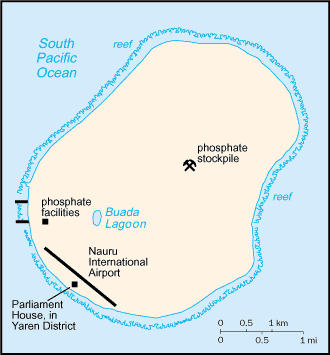|
Nauru
|

|
Capital: no official capital; government offices in Yaren District
Population: 10,756
Brief History of Nauru:
Nauru is a tiny island nation located in the western Pacific Ocean. The island was inhabited for thousands of years by local tribal people. There were 12 tribes living on the island when Europeans showed up in the 1830s. It is thought that the introduction of alcohol and firearms destroyed the peaceful life of the 12 tribes. The tribes warred with each other for 10 years starting in 1878.
In 1886 Germany gained control of the island. Ten years later prospector Albert Ellis discovered that Nauru was rich with phosphate. Phosphate became a major export of the island.
After World War I the island was managed by Britain, Australia, and New Zealand. For a short period during World War II, Japan occupied the island. After WWII, the island became a territory of Australia. Nauru became an independent republic in 1968.
The island of Nauru was environmentally damaged by the phosphate mining over the years. There have been efforts to rehabilitate the areas damaged by the mining, but they have been unsuccessful so far.
The Geography of Nauru
Total Size: 21 square km
Size Comparison: about 0.1 times the size of Washington, DC
Geographical Coordinates: 0 32 S, 166 55 E
World Region or Continent: Oceania
General Terrain: sandy beach rises to fertile ring around raised coral reefs with phosphate plateau in center
Geographical Low Point: Pacific Ocean 0 m
Geographical High Point: unnamed location along plateau rim 61 m
Climate: tropical with a monsoonal pattern; rainy season (November to February)
Major cities:
The People of Nauru
Type of Government: republic
Languages Spoken: Nauruan (official, a distinct Pacific Island language), English widely understood, spoken, and used for most government and commercial purposes
Independence: 31 January 1968 (from the Australia-, NZ-, and UK-administered UN trusteeship)
National Holiday: Independence Day, 31 January (1968)
Nationality: Nauruan(s)
Religions: Christian (two-thirds Protestant, one-third Roman Catholic)
National Symbol:
National Anthem or Song: Nauru Bwiema (Song of Nauru)
Economy of Nauru
Major Industries: phosphate mining, offshore banking, coconut products
Agricultural Products: coconuts
Natural Resources: phosphates, fish
Major Exports: phosphates
Major Imports: food, fuel, manufactures, building materials, machinery
Currency: Australian dollar (AUD)
National GDP: $60,000,000
** Source for population (2012 est.) and GDP (2011 est.) is CIA World Factbook.
Back to Geography Home Page
